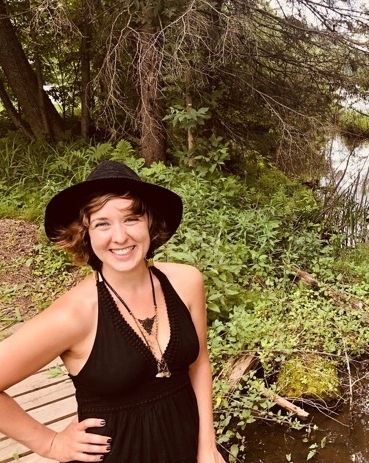"I've Been Dying to Rest in this Body": Mallory Tater's This Will Be Good
Mallory Tater. This Will Be Good. Toronto: Book *hug, 2018. $18 CAD
Mallory Tater’s This Will Be Good is an honest and emotive exploration of girlhood, the pressures of adolescence, and the attempt to find solace. But what struck me most was her framing of eating disorders within deep social and personal mechanisms.
Last year, I read my childhood diaries for the first time. Tater's collection recalled the same feelings: shock and familiarity. Shock: as young as nine, I was writing about how fat I was, about how I needed to go on a diet, about how my weight was why boys didn't like me. Shock: witnessing the same compulsions so clearly laid out in Tater's work. Familiarity: "how badly I believed in starving," the things I thought in secret. Familiarity: the same self-hatred I held in and for my own body. A hatred so deeply normalized that it sometimes felt like an unquestionable part of being alive.
We learn this hatred young. “Such Talented Girls” begins, "I am nine years old, never in character." The speaker pretends to "chew her father's tobacco" and plans "to someday die in full defiant motion" but is scolded by her mother. As punishment she is given makeup and dresses. Told to trade one performance for another. Even our childhood fantasies are deemed inadequate. "The sound of myself discarding / myself." Familiar.
The poem ends with the lament,
I am not
a talented girl, wipe my face with a fallen oak leaf
watch it turn pink, the life I am given.
Here, the speaker’s life is something "given" to her. Not her own. She diminishes her body through self-harm to reassert her ownership over it. Her eating disorder becomes a marker of her identity, and therefore her life.
"I Don't Know How to Be a Hungry Woman" ends,
I'd count out loud
as high as I could and dream I was born
with a gift, that I was the first girl ever
alive who could survive on skim milk,
water and peaches.
Withholding as power. Familiar. Like reading childhood diaries, knowing the struggles I would have in my teenage years with anorexia and bulimia. A kind of amnesiac foreshadowing. The calories written on notecards and shredded in the trashcan. The diet of granola bars and sliced pineapple. Running the bathwater and never getting in the tub. Memories now lost but stored within the body and scrawled on pages. A disassociation from my own childhood body and life.
Tater engages with the body and food as both the source of suffering and the key to transcendence. Spirituality is ineffective, but food is truth. The speaker finds no answers when she asks “so much of Jesus” or watches a mother’s prayer at a funeral. But when she witnesses her babysitter’s bulimia or her mother’s kneeling to pick up bagels, she feels “so far from dying.” In the removal of food, the speaker finds a mock-up of transcendence. Or at least, a path to seek it. A way of organizing. Food rituals to affirm existence. A semblance of control when “I realize/an answer in my life is unknown.”
Familiar. Control can offer a sense of freedom. Becoming lighter can feel like becoming freer; free from the body. “In dream, my sisters' bodies/are replaced with drying leaves.” The ability to float away easily. Shock: that in the grips of disordered eating, I too felt that I was in control.
This freedom latches firmly onto life and plays along the edges of death. As the collection progresses, the speaker faces the unknown with regularity. She urgently witnesses her grandmother’s aging body and the death of her grandfather and childhood friend. She attends funerals. She observes decay. She muses on a potential burial place for herself:
but wouldn't I like this resting place,
wouldn't an angel leaning on me
be both meaningless and full,
or would its unchanging face, pleasured
with sky, taunt and rot a body,
my body, in infinite jealousy.
In this imagined end there is freedom, but no transcendence. Even in death, the body is jealous.
I admire the strength it took to write this book. I have never been able to write publicly about these issues, until now. I found healing within these pages. It helped me to better understand "when you hate a body/so young, what happens."
Conyer Clayton is an Ottawa based artist who aims to live with compassion, gratitude, and awe. She has three chapbooks out or forthcoming: Undergrowth (bird, buried press), Mitosis (In/Words Magazine and Press), and For the Birds. For the Humans. (battleaxe press). Her collaborative album with Nathanael Larochette, If the river stood still, will be released August 2018. Her work appears in ARC, Prairie Fire, The Fiddlehead, The Maynard, In/Words, Puddles of Sky Press, Coven Editions, Bywords, Transom, and others. She won Arc's 2017 Diana Brebner Prize, 3rd place in Prairie Fire's 2017 Poetry Contest, and honourable mention in The Fiddlehead's 2018 poetry prize. She is a member of the sound poetry ensemble Quatuor Gualuor, and writes reviews for Canthius. Check out conyerclayton.com for updates on her endeavours.


